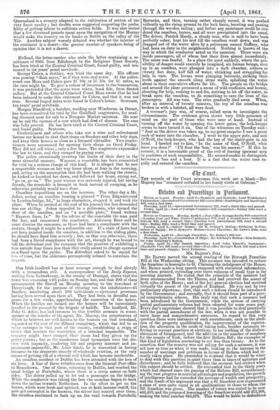One Irish landlord has at least courage enough to deal
sharply with a tremendous evil. A correspondent. of the Daily Express, writing from Letterkenny, in the county of Donegal, states that the town was swarming with police on Sunday last, and that 200 of them accompanied the Sheriff on Monday morning to the townland of Derryvaugh, for the purpose of clearing out the inhabitants-45 families, numbering about 280 individuals — ejectment processes having been served upon them all. They had been in dreadful sus- pense for a few weeks, apprehending the execution of the habere. When the families are turned out. the houses will be immediately levelled to the ground by the brigade of bailiffs. The landlord, Mr. John G. Adair, has had recourse to this terrible measure in conse- quence of the murder of his agent, Mr. Murray, the perpetrators of which he believes are well known to the tenants on that townland, rc,-arded as the seat of the Riband conspiracy, which has led to so ninny outrages in that part of the county, establishing a reign of terror ihat renders the conviction of a criminal impossible. The tenaniry might have escaped their doom had they given up the giiiity parties ; but as the murderous band tyrannizes over the dia- 1 rict with impunity, rendering life and property insecure and im- provement impossible, Mr. Adair thinks lie is warranted in having recourse to the desperate remedy of wholesale eviction, as the only means of getting rid of a chronic evil which has become intolerable.
An omnibus accident at Dublin has been attended with the loss of six lives. A line of these vehicles runs from the General Post-office to Roundtown. One of these, returning to Dublin, had reached the canal bridge at Portobello, where there is a steep ascent on both sides. The driver pulled up to let out a passenger on the bridge. While the conductor was taking the fare the omnibus began to back down the incline towards Rathrnines. In the effort to get on the horses, which were fresh and spirited, one or both became restiff, the pole got entangled in the harness, the driver lost control over them, the omnibus continued to back up on the road towards Portobello Barracks, and then, turning rather sharply round, it was pushed violently up the rising ground to the lock basin, bursting and passing through the wooden railing ; and before any assistance could be ren- dered the omnibus, horses, and all were precipitated into the canal. The driver, Patrick Hardy, a steady man, who is said to have been
perfectly sober, kept his seat till the omnibus went down, and was dragged out- of the water alive by a policeman named Gaffney, who, had been on duty in the neighbourhood. Nothing is known of the way in which the conductor acted on the occasion. There were six inside passengers, all of whom lost their lives almost immediately. The scene was fearful. In a place the most unlikely, where the pos- sibility of danger could scarcely be imagined, six human beings, shut up in an omnibus, were plunged into a dark chamber, sixteen or twenty feet deep, half full of water, shrieking and struggling for help in vain. The horses were plunging furiously, striking their hoofs against the smooth slimy stone walls, splashing the water shoat in their convulsive efforts for life. The people on the bridge and around the place presented a scene of wild confusion and horror, shouting for help, rushing to and fro, striving to let off the water, to break open the omnibus, to do something to save the lives of the. passengers. All was vain. The cries gradually died away. When, after an interval of twenty minutes, the top of the omnibus was broken in with a hatchet, all were dead.
A coroner's jury was, of course, called upon to investigate the circumstances. The evidence given shows very little presence of mind on the part of those who were near at hand. Instead of turning off the water by opening the lower gates, the lock-keeper seems to have turned it on. One of the witnesses on Tuesday said : "Just as the driver was taken up, to my great surprise I saw a great rush of water into the chamber. I went to the upper gate, and met O'Neill, the lock-keeper, who had the key of the sluice-gate in his hand. I bawled out to him, 'In the name of God, O'Neill, what have you done?' I'll float the 'bus,' was his answer." If this be correct, it is a lamentable proof of the evil of leaving ignorant men in positions of such responsibility. He seemed unable to distinguish between a 'bus and a boat. It is a fact that the water rose ra- pidly and covered the omnibus.






























 Previous page
Previous page